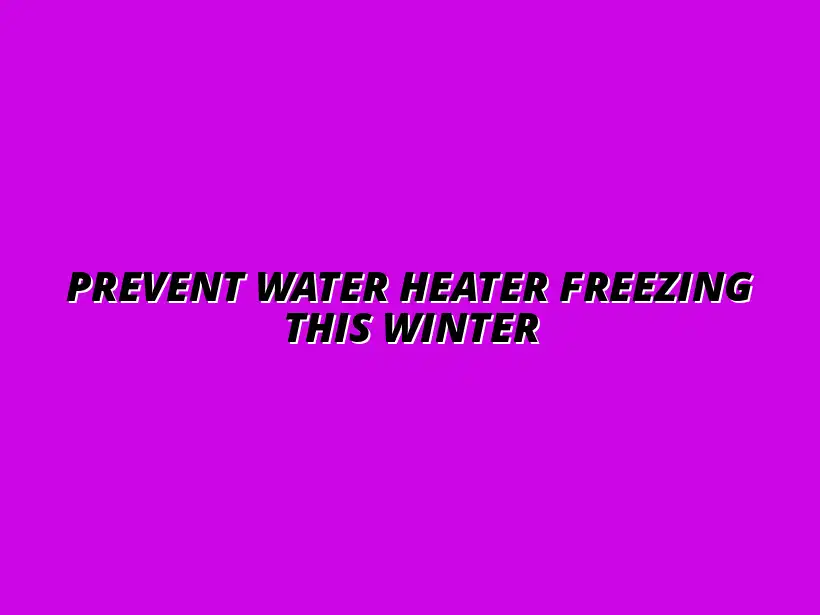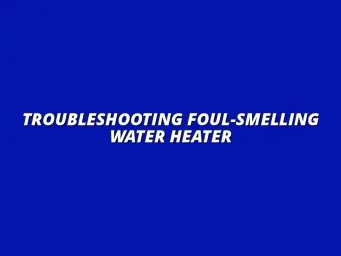
Prevent Water Heater Freezing This Winter
Understanding the Importance of Preventing Water Heater Freeze
When winter rolls around, one of the most critical things to consider is the potential damage freezing temperatures can cause to water heaters. A water heater that freezes can lead to not only costly repairs but also complete replacements. It's essential to understand these risks to save money and avoid the hassle of dealing with a broken heater when you need it the most!
The Impact of Freezing on Water Heaters
Freezing temperatures can cause the water inside the heater to expand, which may lead to cracks in the tank or even burst pipes. Not only does this damage require immediate attention, but it can also result in significant water damage to your home. In many cases, homeowners might find themselves facing bills that are thousands of dollars for repairs or replacements, making prevention worth the effort! For more information on preventing frozen pipes this winter, check out these helpful preventative maintenance tips.
- Cracking of the tank
- Pipe bursts
- Increased repair costs
- Potential water damage to property
Why Winterization of Water Heaters is Crucial
Winterizing your water heater is not just a smart precaution; it is a necessity to avoid unexpected problems. If your water heater is unprepared for the winter months, you risk not only damage but also safety hazards. Imagine dealing with a burst tank on a cold winter night—that's a nightmare!
Additionally, an unprotected water heater may not function efficiently, leading to higher energy bills. When a water heater works harder due to freezing issues, it consumes more energy, which means more money spent each month. Learn more about maintaining your water heater efficiently to avoid these extra costs. Taking steps to winterize your heater can save you from these expenses!
Key Strategies for Preventing Water Heater Freeze
Now that we understand the risks, let’s dive into some effective strategies to keep your water heater protected from the cold. Implementing the right preventive measures can help ensure your water heater operates smoothly all winter long.
Insulation Techniques for Optimal Protection
One of the best ways to protect your water heater from freezing is through proper insulation. There are several insulation materials and methods available, each with its benefits. By wrapping your water heater, you can maintain a consistent temperature, even during the coldest months. For more tips on winter plumbing, see our guide on winter plumbing tips to prevent freezing.
- Pipe insulation: Use foam sleeves around exposed pipes.
- Heater blankets: Invest in a water heater insulation blanket.
- Reflective insulation: Apply this around the heater for added protection.
Choosing the Right Insulation Material
When it comes to insulation, the right material can make all the difference in preventing freezing. Here are some popular options:
- Foam: Easy to install and provides excellent insulation.
- Fiberglass: A cost-effective option that offers solid thermal resistance.
- Reflective insulation: Helps to reflect heat back to the water heater.
Choosing the right insulation not only protects your water heater but also improves its efficiency!
Step-by-Step Insulation Process
Ready to insulate your water heater? Here’s a simple step-by-step guide:
- Turn off the heater and allow it to cool.
- Measure the dimensions of the water heater.
- Cut the insulation material accordingly.
- Wrap the insulation around the heater and secure it.
- Don’t forget to insulate the pipes connected to the heater!
Following these easy steps can help ensure that your water heater stays warm and functional all winter! If you need assistance with any plumbing issues, consider contacting a local plumber. For example, if you're in Billesley, Birmingham, you can find a plumber in Billesley, Birmingham.
Summarizing Key Preventive Actions Against Water Heater Freezing
To prevent water heater freezing and the potential damage it can cause, it's essential to consider several effective strategies. These strategies include proper insulation, maintaining adequate temperatures, and consistent maintenance routines. By reviewing these key points, you can ensure that your water heater remains in working order throughout the winter months.
Here’s a quick recap of effective preventive actions:
- Insulate your water heater with appropriate materials.
- Maintain a minimum water temperature of 120°F to prevent freezing.
- Regularly drain and flush the water tank to eliminate sediment.
- Inspect vulnerable areas of your home for cold exposure.
- Use smart technology to monitor your water heater's temperature.
Encouraging Proactive Maintenance Practices
Regular maintenance of your water heater is key to ensuring its longevity and efficiency. By practicing proactive measures, you can catch potential issues before they escalate into costly repairs. These seasonal checks should encompass a thorough inspection of insulation, temperature settings, and overall performance. For tips on annual water heater inspections, see our guide on annual water heater inspection tips.
Consider incorporating the following maintenance practices into your routine:
- Inspect and clean the area around your water heater at least once a month.
- Schedule a professional maintenance check at least once a year.
- Flush the tank every six months to remove sediment buildup.
- Check insulation and add more if necessary.
Final Thoughts and Call to Action
Promoting Year-Round Awareness for Water Heater Care
It's vital to adopt a proactive approach to water heater care, not just in winter but year-round. This means routinely checking on your unit, being mindful of temperature settings, and ensuring that insulation is effective. By doing so, you can extend the life of your water heater and prevent unexpected breakdowns. Addressing corrosion is also important for long-term water heater health. Learn more about preventing corrosion in water heaters.
Here are some tips for maintaining awareness throughout the year:
- Keep a maintenance calendar for regular checks.
- Stay informed about common issues through community forums.
- Recognize seasonal changes that may impact your water heater.
Engage with Our Community for More Tips
We want to hear from you! Sharing your experiences and tips related to water heater maintenance can help others in our community. Whether you have a question about a specific issue or advice from your own journey, your input is invaluable. For basic winter plumbing tips concerning frozen pipes, see our guide on winter plumbing tips for frozen pipes.
Feel free to reach out and participate in discussions or ask additional questions. Together, we can enhance our knowledge and ensure that our water heaters remain efficient and reliable all year long!




